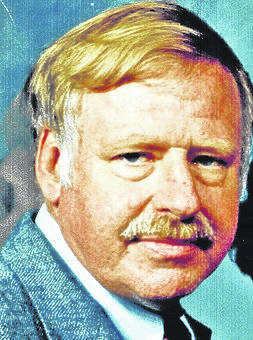
This is a mid-year tribute to teaching — at all levels, K to college. The transfer of knowledge requires both the presence and attentiveness of the students. Two of my college instructors excelled in ensuring these prerequisites for learning.
First day of class. A. J. Lohwater, 6’4” and attired in a three-piece suit, strode from his desk to our classroom door and locked it at precisely 8 a.m. Thirty seconds later a student found the door locked and rapped loudly on the frosted-glass portion of the door.
No one moved. The “rapping” grew fainter and fainter until the student gave up and left. No one was ever again late for A.J.’s class. Lesson learned.
But once in the classroom, the student must remain attentive. A fellow sitting next to me had slowly slipped into a deep sleep while our physics instructor was writing on the board. Soon the soft whispery sound of snoring filled the room. The professor peeked over his shoulder — much like a pitcher checking the runner on first base.
Having located the offending student, he whirled and fired an eraser that caught the student square in the forehead. I had never seen someone wake up instantly, the poor fellow levitating straight up out of his seat. No more napping in that class.
A student was recently talking to his high school English teacher. More specifically, I was the student, and my teacher’s now 104 years old. She personifies the fact that there’s life after teaching and that teachers often have hidden qualities not seen in the classroom.
Soon after Miss M retired, she got married, moved to Florida, and learned how to fly an airplane—flying solo until age 92 and driving her car until 102. No one in my small township school in Ohio could ever have envisioned Miss M doing any of those things. Teachers can surprise you.
Teaching also often blends the old and the new and is ever evolving with today’s technology.
Our son teaches archaeology in the Boston area. A recent text from him said that he and his class were on a bus and would soon arrive at Olympus and then Delphi. Not possible in my day. His college has a three-week January term that allows travel. Their tour of Greece will end at our son’s dig site north of Athens where they’ll be able to fly drones used in his Late Bronze Age research project.
I must confess to teaching’s being a big part of my life and family history — my mother, wife, sister, and grandfather were all teachers. The family trade began in 1807 when my great-great-grandfather set up a subscription school (a nickel a day) in rural Ohio. The students came early one day and locked him out — a prank called “barring out.”
He redirected the smoke back down the one-room school’s chimney and taught the pranksters a lesson. A. J. would have been proud of him.
Finally, the experiences of an ancestral cousin who started a missionary school in India in the 1890s have given me a new appreciation for the importance and diversity of teaching. Rev. Sam Perrine’s mission school was in the remote hills and jungle of Nagaland, home to headhunters at one time. He wrote about his school, as below.
“One of our students, though just commencing his studies, reveals the finest mind I have found among the Naga people. He has the student temperament and handles his lesson as though he had been trained under a master for years instead of running wild in the jungle. The need of advance work is the need of a lost world.” Rev. Sam saw potential in all of his students, but even the most gifted needed to be challenged.
Rev. Sam also saw the spread of education across 19th-century America as “missionary work.” In an 1898 paper, he wrote: “The God of missions has put into the heart of his people to dot America all over with schools, colleges, and universities. Multitudes are trained to solve vexing problems and to make the world better.”
Indeed, let us pay homage to the fundamental role education has played in the development of our nation. And let us also be humble enough to admit that we’re never too old to learn, will never cease to need great teachers, and that not all teaching takes place in the classroom. Locking doors and throwing erasers can be instructive.
James F. Burns is a retired professor at the University of Florida. He was born in Cincinnati and grew up near Coney Island. His cousins, the Varneys, had a farm just outside Wilmington where the family reunions were held.


